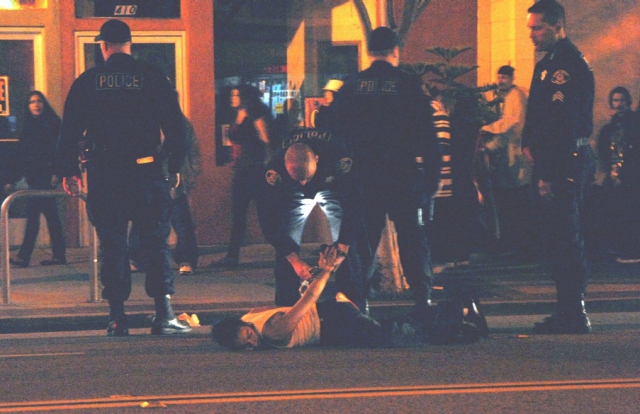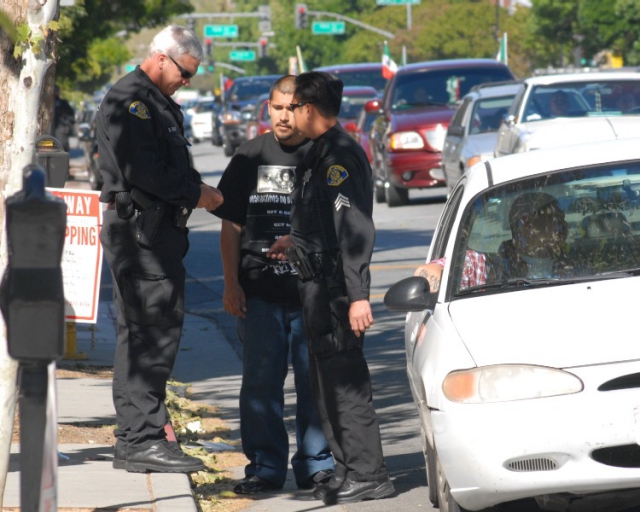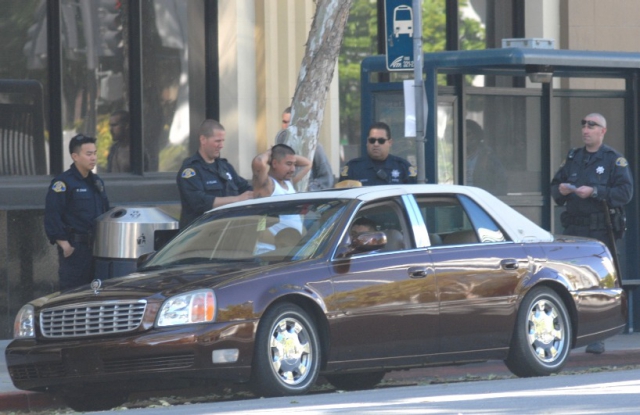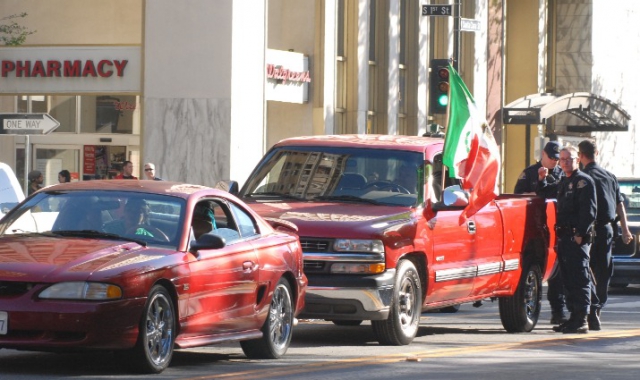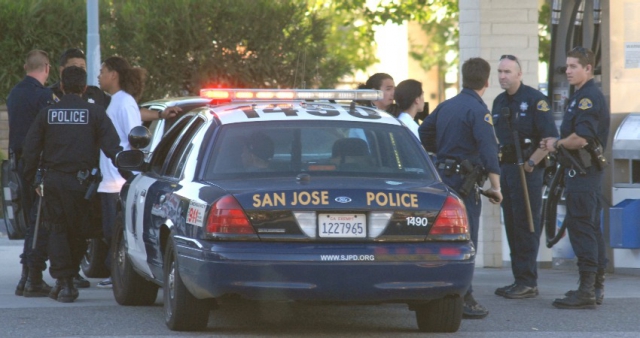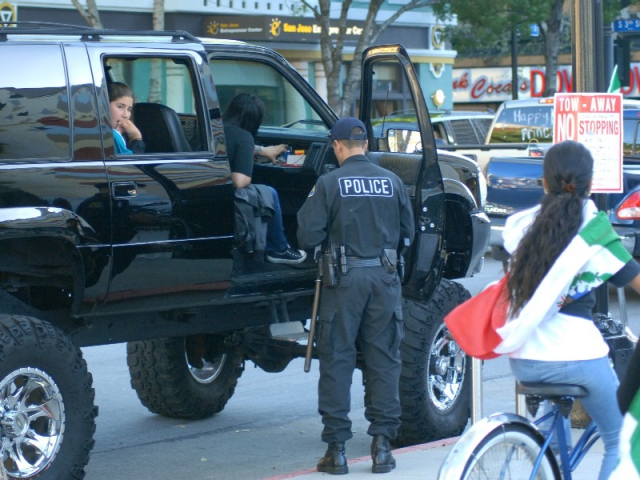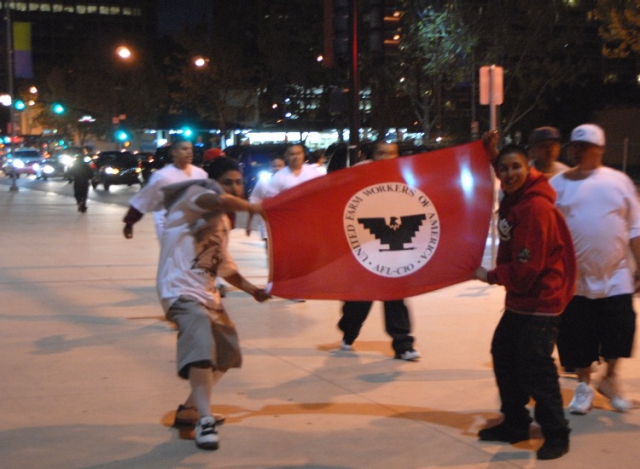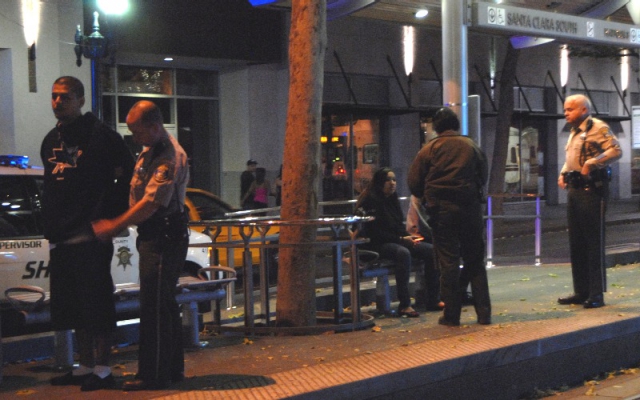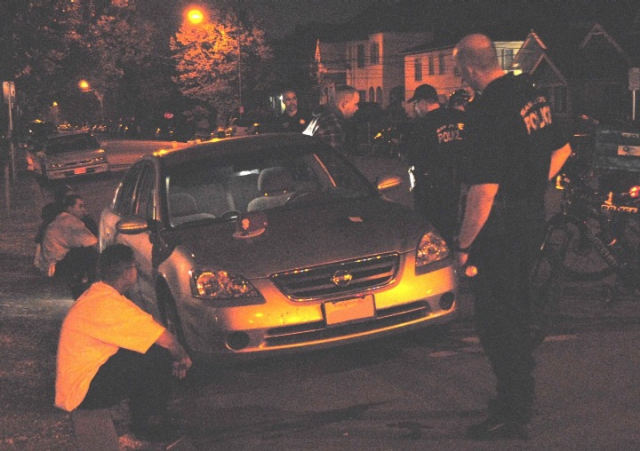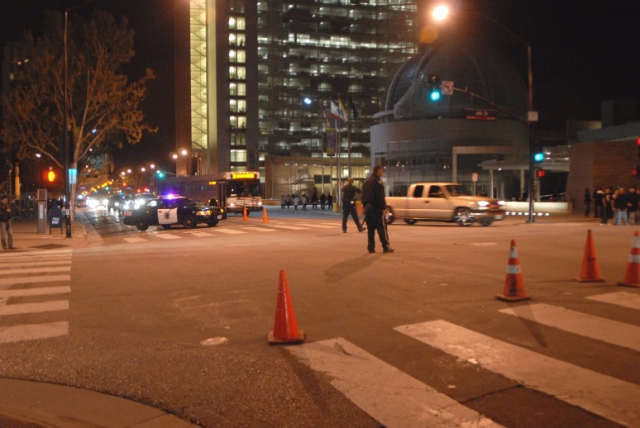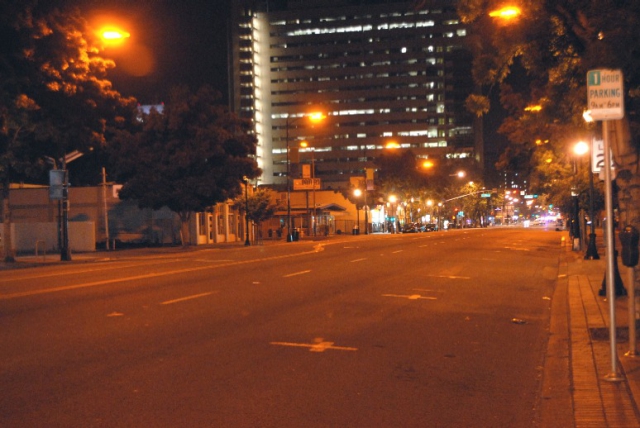From the Open-Publishing Calendar
From the Open-Publishing Newswire
Indybay Feature
Cinco de Mayo Street Celebrations Shut Down by San José Police
During Cinco de Mayo celebrations, residents of San José faced daytime checkpoints, citations, and arrests on a scale not matched by any other festival of the year. By 10 pm the focus appeared to be diverting cars and mostly-Latino youths from the downtown area, effectively evacuating the city center and shutting down street celebrations on two nights.
Cars adorned with Mexican flags and red flags of the United Farm Workers – founded by former San José resident César Chávez – crept down Santa Clara Street bumper-to-bumper. Joyous rhythmic Mexican music blared through the air of a cooler-than-normal Sunday in May. Some car owners were out to show off their low-riders whose pneumatic suspensions made their cars “dance” in the street. A few gunned their engines in quests for attention. In general, there was little evidence of activity that would endanger public safety.
However, during the daytime on May 2, 2010 during two half-hour intervals on seven blocks of Santa Clara Street, there were at least 9 different cars stopped by San José police. This amounts to more than one stop every seven minutes. In the majority of cases, a citation was issued. Two cases led to arrests. Another case involved a time-consuming inspection of the under-carriage of an SUV. Two cars were released without citation. Cars were being asked to stop for inspection without any obvious traffic violation or unsafe behavior. With bumper-to-bumper traffic, speeding was impossible. Each case was photographically documented.
This writer walked along Santa Clara Street between Eighth Street to First Street for a half hour from 4:35 pm to 5:05 pm and again from 5:45 pm to 6:15 pm. The time in between was spent walking down Market Street to San Carlos Street up to Discovery Meadow where the official Cinco de Mayo celebration was being held and no police cars were on patrol.
The frequency of stops was a reduction in targeting the Mexican American holiday over 2009, when 14 vehicle stops per hour were photographically documented along a 4-block section of Santa Clara Street (Sharat G. Lin, “San José Police Department targets Latinos, photo survey shows,” Indybay, May 19, 2009, http://www.indybay.org/newsitems/2009/05/19/18595858.php).
On Sunday evening between 9 and 10 pm, as traffic backed up downtown, police road blocks prevented cars from turning south from Santa Clara Street towards San José State University or east from Fourth Street. The road blocks appeared to be aimed at funneling traffic out of downtown to the eastside or onto Freeway I-680. However, southbound traffic on King Road and Jackson Avenue was also prevented from reaching Story Road. Several drivers later complained that police refused to allow them to reach their homes even when they offered to show proof of residence in the area.
A similar scene was repeated on the night of Wednesday, May 5. Numerous groups of youths began walking down Santa Clara Street in the evening. Police resumed stops of vehicles and pedestrians. By 10:30 pm the road blocks were in place to divert traffic out of the downtown area. Before midnight, Santa Clara Street had been virtually evacuated.
“I’ve never seen anything like this anywhere else,” observed new resident Chris Lepe. “In the tenth largest city, downtown has been turned into a ghost town.”
The police presence was intensely focused on Santa Clara Street where Latinos, joined by other people of color, were out to enjoy Cinco de Mayo by cruising into downtown from the eastside. The visible police presence was important in effectively preventing numerous groups of youths from doing mischief. However, the arbitrary pulling over of cars at random checkpoints yielded few citations for violation of public safety, such as driving while intoxicated or threats of violence. Most youths were too young to be even admitted into bars. Instead, many citations were for license or registration documents out of order, parole violations, and issues not related to immediate public safely.
This raises the question as to why the San José Police Department does not implement the same sorts of random checkpoints during other crowded festivals like the Saint Patrick’s Day parade, Tet Festival, Veterans’ Day parade, Independence Day, Amgen Tour of California, or Christmas in the Park. A similar question can be asked about why SJPD does not evacuate downtown routinely on Friday and Saturday nights or on New Year’s Eve when crowds are out late and the bars are full.
The controversy over alleged San José police targeting of Latinos began years ago with charges that police made more arrests during Cinco de Mayo celebrations than at any other time of the year in apparent response to a few years of reported rowdiness and public drunkenness. These allegations against the police were given more weight when the San Jose Mercury News (Sean Webby, “Drunkenness arrests in San Jose outpace other California cities,” October 18, 2008, http://www.mercurynews.com/san-jose-public-drunkenness/ci_10755739) reviewed arrest data, showing that 57 per cent of those charged with public drunkenness in San José in 2007 were Hispanic. Yet Hispanics represented only 32 per cent of the city’s population in that year.
Community leaders have repeatedly emphasized that the community is not against the police, but really wants to work with police to ensure public safety. A visible police presence is necessary to keep the peace, but frequent stops exclusively on Cinco de Mayo appear to be discriminatory. The unnecessary stops only serve to drive a wedge between police and the community, and in particular between the police and Latino youths. This can only have an adverse impact in preventing and investigating crime.
Community activists have repeatedly appealed to the San José City Council to review police practices on Cinco de Mayo. At a time of San José’s most severe budget crisis ever, many residents are asking how the city can afford thousands of hours of police overtime pay for unprecedented enforcement actions exclusively on Cinco de Mayo.
However, during the daytime on May 2, 2010 during two half-hour intervals on seven blocks of Santa Clara Street, there were at least 9 different cars stopped by San José police. This amounts to more than one stop every seven minutes. In the majority of cases, a citation was issued. Two cases led to arrests. Another case involved a time-consuming inspection of the under-carriage of an SUV. Two cars were released without citation. Cars were being asked to stop for inspection without any obvious traffic violation or unsafe behavior. With bumper-to-bumper traffic, speeding was impossible. Each case was photographically documented.
This writer walked along Santa Clara Street between Eighth Street to First Street for a half hour from 4:35 pm to 5:05 pm and again from 5:45 pm to 6:15 pm. The time in between was spent walking down Market Street to San Carlos Street up to Discovery Meadow where the official Cinco de Mayo celebration was being held and no police cars were on patrol.
The frequency of stops was a reduction in targeting the Mexican American holiday over 2009, when 14 vehicle stops per hour were photographically documented along a 4-block section of Santa Clara Street (Sharat G. Lin, “San José Police Department targets Latinos, photo survey shows,” Indybay, May 19, 2009, http://www.indybay.org/newsitems/2009/05/19/18595858.php).
On Sunday evening between 9 and 10 pm, as traffic backed up downtown, police road blocks prevented cars from turning south from Santa Clara Street towards San José State University or east from Fourth Street. The road blocks appeared to be aimed at funneling traffic out of downtown to the eastside or onto Freeway I-680. However, southbound traffic on King Road and Jackson Avenue was also prevented from reaching Story Road. Several drivers later complained that police refused to allow them to reach their homes even when they offered to show proof of residence in the area.
A similar scene was repeated on the night of Wednesday, May 5. Numerous groups of youths began walking down Santa Clara Street in the evening. Police resumed stops of vehicles and pedestrians. By 10:30 pm the road blocks were in place to divert traffic out of the downtown area. Before midnight, Santa Clara Street had been virtually evacuated.
“I’ve never seen anything like this anywhere else,” observed new resident Chris Lepe. “In the tenth largest city, downtown has been turned into a ghost town.”
The police presence was intensely focused on Santa Clara Street where Latinos, joined by other people of color, were out to enjoy Cinco de Mayo by cruising into downtown from the eastside. The visible police presence was important in effectively preventing numerous groups of youths from doing mischief. However, the arbitrary pulling over of cars at random checkpoints yielded few citations for violation of public safety, such as driving while intoxicated or threats of violence. Most youths were too young to be even admitted into bars. Instead, many citations were for license or registration documents out of order, parole violations, and issues not related to immediate public safely.
This raises the question as to why the San José Police Department does not implement the same sorts of random checkpoints during other crowded festivals like the Saint Patrick’s Day parade, Tet Festival, Veterans’ Day parade, Independence Day, Amgen Tour of California, or Christmas in the Park. A similar question can be asked about why SJPD does not evacuate downtown routinely on Friday and Saturday nights or on New Year’s Eve when crowds are out late and the bars are full.
The controversy over alleged San José police targeting of Latinos began years ago with charges that police made more arrests during Cinco de Mayo celebrations than at any other time of the year in apparent response to a few years of reported rowdiness and public drunkenness. These allegations against the police were given more weight when the San Jose Mercury News (Sean Webby, “Drunkenness arrests in San Jose outpace other California cities,” October 18, 2008, http://www.mercurynews.com/san-jose-public-drunkenness/ci_10755739) reviewed arrest data, showing that 57 per cent of those charged with public drunkenness in San José in 2007 were Hispanic. Yet Hispanics represented only 32 per cent of the city’s population in that year.
Community leaders have repeatedly emphasized that the community is not against the police, but really wants to work with police to ensure public safety. A visible police presence is necessary to keep the peace, but frequent stops exclusively on Cinco de Mayo appear to be discriminatory. The unnecessary stops only serve to drive a wedge between police and the community, and in particular between the police and Latino youths. This can only have an adverse impact in preventing and investigating crime.
Community activists have repeatedly appealed to the San José City Council to review police practices on Cinco de Mayo. At a time of San José’s most severe budget crisis ever, many residents are asking how the city can afford thousands of hours of police overtime pay for unprecedented enforcement actions exclusively on Cinco de Mayo.
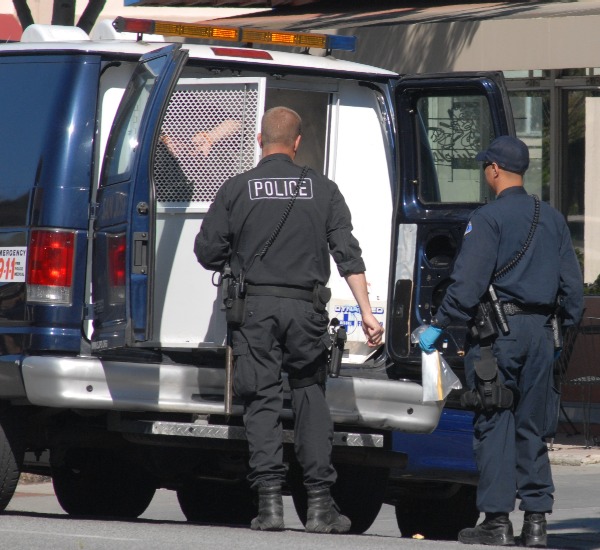
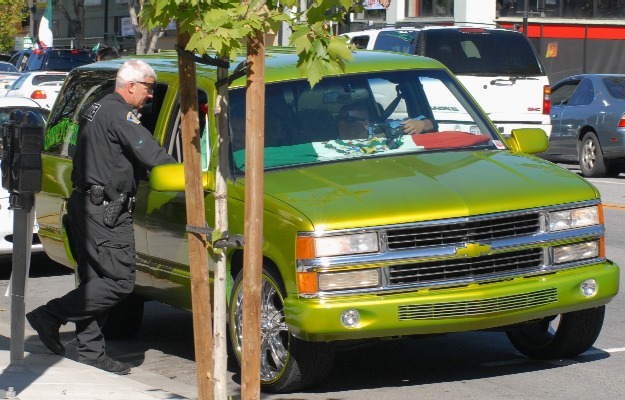
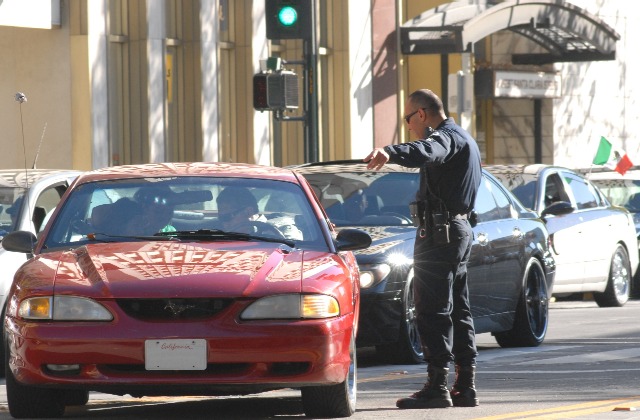
Add Your Comments
Comments
(Hide Comments)
Yes, every year it is the same...but I see that it may be less than last year. Maybe that is because we are finally going to get some oversight and the police are slightly more cautious?
Thank you.
I've lived downtown for 10 years and I understand the point you're trying to make, but you're *really* far off from reality.
a) you quote the percentages of Latinos as population versus citations etc... San Jose is HUGE and the areas around where you were taking the photographs (districts 3 and 7) are VERY HEAVILY LATINO in terms of population. (58%, 47%).
This must mean that NON-Latinos were being unfairly targeted by police, right?
http://www.sanjoseca.gov/planning/Census/dstprofiles.asp
b) the same forces ARE in effect every weekend in the summer. Not to the same extent, but there is a very severe police presence. When it's warm, people hang out on Santa Clara street and it's the same kind of traffic jam and the same people. Because there are so many Latinos around downtown SJ it's a destination for other Latinos from Salinas and Gilroy when they want to go out and have fun for the night.
c) sometimes those out-of-town visitors want to cause trouble instead- San Jose is almost entirely Norteno (which is why you saw so much red- the Cesar Chavez flag isn't about anything to do with farm workers btw, it's a gang identification). Before the heavy police presence on summer weekends, Santa Clara St had one side of the street wearing red and the other blue and violence was common and seriously out of control.
d) St Patrick's day isn't "targeted" because it's not a problem- but you know what is? Mardi Gras- no racial/ethnic affiliation there at all, and it causes the same problems. If you'd lived here you'd know what I'm talking about- police cars being flipped over and set on fire, 5 shootings, business windows being broken for blocks, and "this year being a great improvement over last year because there were only 11 stabbings"... ALL in that little several-block area surrounding what is now city hall.
This has NOTHING to do with any anti-Latino sentiment whatsoever- the idea is simple- when you have a big celebration in a place populated with lots of Latinos and that also is a destination spot for other large Latino communities, most of the people that get pulled over and/or arrested are going to be... wait for it... LATINO.
a) you quote the percentages of Latinos as population versus citations etc... San Jose is HUGE and the areas around where you were taking the photographs (districts 3 and 7) are VERY HEAVILY LATINO in terms of population. (58%, 47%).
This must mean that NON-Latinos were being unfairly targeted by police, right?
http://www.sanjoseca.gov/planning/Census/dstprofiles.asp
b) the same forces ARE in effect every weekend in the summer. Not to the same extent, but there is a very severe police presence. When it's warm, people hang out on Santa Clara street and it's the same kind of traffic jam and the same people. Because there are so many Latinos around downtown SJ it's a destination for other Latinos from Salinas and Gilroy when they want to go out and have fun for the night.
c) sometimes those out-of-town visitors want to cause trouble instead- San Jose is almost entirely Norteno (which is why you saw so much red- the Cesar Chavez flag isn't about anything to do with farm workers btw, it's a gang identification). Before the heavy police presence on summer weekends, Santa Clara St had one side of the street wearing red and the other blue and violence was common and seriously out of control.
d) St Patrick's day isn't "targeted" because it's not a problem- but you know what is? Mardi Gras- no racial/ethnic affiliation there at all, and it causes the same problems. If you'd lived here you'd know what I'm talking about- police cars being flipped over and set on fire, 5 shootings, business windows being broken for blocks, and "this year being a great improvement over last year because there were only 11 stabbings"... ALL in that little several-block area surrounding what is now city hall.
This has NOTHING to do with any anti-Latino sentiment whatsoever- the idea is simple- when you have a big celebration in a place populated with lots of Latinos and that also is a destination spot for other large Latino communities, most of the people that get pulled over and/or arrested are going to be... wait for it... LATINO.
Not that i condonde the action so SJPD, but all of the vehicle stops had noticeable vehicle code violations. The one SUV that had the udnercarriage inspected was stop as a high rise vehicel and the others all had no front plates.. duhhh all vehicle code violations.
We are 100% volunteer and depend on your participation to sustain our efforts!
Get Involved
If you'd like to help with maintaining or developing the website, contact us.
Publish
Publish your stories and upcoming events on Indybay.
Topics
More
Search Indybay's Archives
Advanced Search
►
▼
IMC Network


